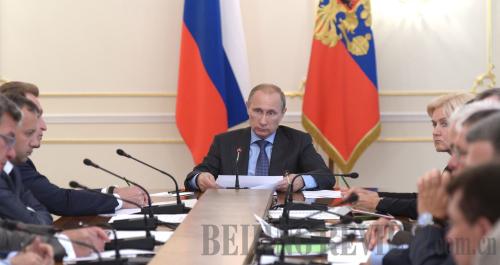|
 |
|
SEEKING A STRATEGY: Russian President Vladimir Putin hosts a cabinet meeting in Moscow on July 30 to discuss measures to deal with Western sanctions (XINHUA/AFP) |
Since the Malaysia Airlines flight MH17 was brought down in east Ukraine on July 17 killing all 298 people on board, Russia has faced a new wave of tough sanctions pushed for by the United States and its allies.
On July 29, the EU announced to impose a package of additional restrictive measures on Russia's finance, defense and energy sectors, effective as of August 1. U.S. President Barack Obama then unveiled new penalties on Russia. Following the EU and the United States, Canada and Japan also imposed sanctions against Russia.
This round of sanctions is much broader and tougher than previous measures since the West first decided to tighten economic clamps on Russia on March 17 due to Moscow's support for the Black Sea Crimean Peninsula's split from Ukraine. They represent "a strong warning" and "a powerful signal" to Russia that "destabilizing Ukraine or any other neighboring East European country will bring heavy costs to its economy," said a European Council statement.
At present, Western sanctions have expanded to 95 Russian individuals and 23 companies from energy, defense and finance sectors, including Russian oil giant Rosneft, its second largest natural gas company Novatek, and major banks such as Gazprombank and Russia's state-owned development lender VEB.
Mutually painful sanctions
The Russian economy is mainly resource-based and the new sanctions hit its key areas, said Feng Yujun, Director of the Institute of Russian Studies under the Beijing-based China Institutes of Contemporary International Relations.
During the Cold War, the Soviet Union and its East European allies in the Council for Mutual Economic Assistance were able to maintain a separate market from the West. But in the modern era, the global economy has been bonded together to such a degree that the Russian economy will inevitably be impacted by such sanctioning, Feng said.
Russia is the world's largest natural gas exporter and its second largest oil exporter. The West is imposing restrictive measures on Russia's energy products, which account for 70 percent of the nation's total exports, and will limit its access to capital markets and acquisition of technologies for oil and gas exploration. The United States and EU have also banned trade in arms with Russia, further restraining its role in the global market.
The sanctions have already taken a toll on the Russian stock market and currency. With limited access to investment, some large state-owned Russian enterprises are facing mounting debt pressures. Inhabiting an environment of sanctions, Russia's economic growth is unlikely to exceed 1 percent this year, according to various research institutions. It is estimated that Russia will suffer losses of $133.7 billion from the new round of sanctions over two years.
But the act of sanctioning is itself a double-edged sword in the highly interdependent global economy, and the latest round is sure to damage the European economy in return, according to Feng.
The EU and Russia share extensive economic and trade relations. The EU is the largest trading partner of Russia and Russia is the EU's third. According to statistics from the European Commission, trade between EU countries and Russia reached $461 billion last year.
Above all, many European countries rely heavily on oil and gas imports from Russia. According to the independent think tank Open Europe, Russia accounts for 24 percent of EU countries' gas imports on average. For example, almost 20-40 percent of gas used in Germany and Italy is from Russia and the figure for Austria hits as high as 60-80 percent. Moreover, European countries are unlikely to find alternative gas and oil suppliers in the near future.
Compared to the EU, the United States has little at stake in sanctioning Russia. While the United States is Russia's fifth largest trading partner, Russia ranks 20th on the U.S. trading partner list. U.S.-Russia trade stood at just $38 billion last year.
Washington has persistently urged Brussels to take a tough position on Moscow to boost the effectiveness of sanctions ever since the Ukraine crisis broke out.
However, the EU had taken a prudent stance on imposing sanctions against Russia before the recent measures. "Although the EU kept pace with the United States on the timetable of sanctions, the EU sanctions were not as severe as the U.S. measures in practice—the EU doesn't want to pay a big price for imposing the economic sanctions," Feng said.
To some extent, the downing of MH17 in east Ukraine was the immediate trigger for the EU's new sanctions. Observers say that EU leaders learned from the MH17 catastrophe that they have to do something to stop the spillover of Ukraine's crisis.
| 